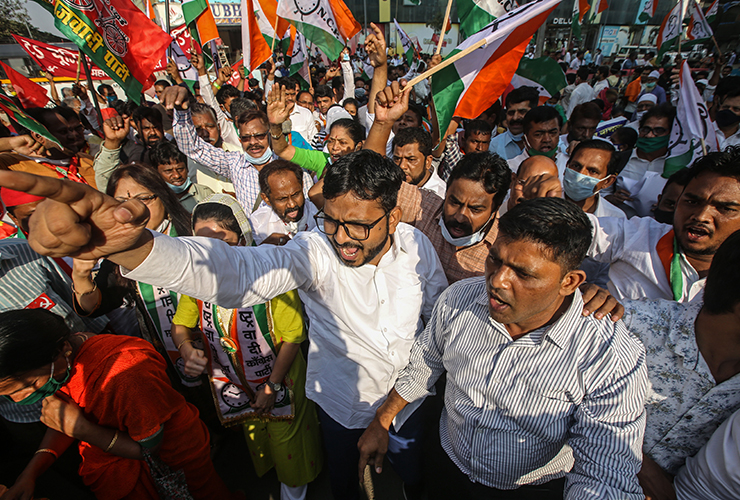The International Press Institute (IPI), a global network of editors, media executives and leading journalists for press freedom, condemns the legal harassment of journalists and media outlets in connection with ongoing mass protests by farmers in India, as well as wider attempts to stifle the free flow of information in the country.
Since November 2020, farmers in India have been protesting against new agricultural laws that reduce the government’s involvement in agriculture and open opportunities for private investors. The protests have been accompanied by an alarming increase in legal harassment of critical journalists and independent media organizations attempting to cover them.
Before the protests, the Indian government was already targeting journalists and independent media in an attempt to control the narrative on the COVID-19 pandemic but the movement of Indian farmers, which is now entering its fourth month, has worsened the crackdown on press freedom.
In light of the protests, the Indian government has taken severe actions against media organizations and journalists that include arrests, charges, harassment, suspension of internet access and the blocking of social media accounts of prominent media figures and organizations.
“We call on the Indian authorities to end the harassment of journalists covering the ongoing farmers’ protests, which are clearly a matter of public interest”, IPI Deputy Director Scott Griffen said. “These acts of intimidation reflect the broader worsening of press freedom in India, especially the abuse of sedition and defamation laws. Lawmakers in India must urgently take steps to stop the legal harassment of critical journalists, which is damaging the public’s right to information in the world’s largest democracy.”
Recent Developments
As protests continue to spread across the country, law enforcement agencies have increasingly stifled the free flow of information.
The Editors Guild of India (EGI) has reported more than 15 instances of attacks against journalists in January 2021, most in connection with coverage of the protests.
On January 28, six senior journalists were charged with sedition for reporting on an alleged shooting by police officers during a tractor rally coinciding with India’s celebration of its 72nd Republic Day that led to the death of a farmer.
On January 30, police in Uttar Pradesh filed a first information report (FIR) against The Wire founding editor Siddharth Varadarajan for tweeting a story from The Wire that included statements given by the family of the farmer who died during the tractor rally. A day later, The Wire and one of its staff members, Ismat Ara, were added to the FIR.
On the same day, two other journalists, Mandeep Punia of Carvan Magazine and Dharmender Singh of Online News India, were detained by the police while on assignment covering the farmers’ protests near the village of Singhu, just outside New Delhi. They were charged with obstructing law enforcement officials. Both have now been granted bail.
Other cases of freedom press violations
The harassment of journalists covering the farmers’ protests occurs in a wider context of growing government pressure on the media in India. 2020 saw a rise in the use of draconian laws to silence criticism, especially sedition laws, in many cases in the context of COVID-19 coverage, where the government has sought to control the narrative. In October, IPI issued a joint call to the Indian authorities to take immediate action to protect journalists and ensure that they are able to carry out their duties without fear of reprisal or harassment.
The troubling trend has continued in the new year.
On January 17, two journalists from the online news portal The Frontier Manipur in the far eastern Indian state of Manipur were detained and charged under the Unlawful Atrocities (Prevention) Act (UAPA) and Section 124A (sedition) of the Indian Penal Code. The outlet had recently reported on a drug case with possible links to Manipur Chief Minister N. Biren Singh.
On January 20, an arrest warrant was issued by a court against journalist Paranjoy Guha Thakurta for defamation. The warrant was in relation to a complaint filed by the Adani Group, an Indian multinational conglomerate, in 2017 following the publication of an article by the Economic and Political Weekly. Thakurta was the publication’s editor-in-chief at the time. The publication accused the Indian government of modifying rules related to special economic zones.
On January 25, three journalists from K News, a TV news channel in the northern Indian state of Uttar Pradesh, were accused of misreporting on school children performing yoga in the cold without proper attire. The police filed an FIR accusing the journalists of incitement and criminal intimidation as well as violation of the Information Technology Act.
Another significant case is that of journalist Siddiqu Kappan, who has spent more than 100 days in custody. The Supreme Court has adjourned a habeas corpus challenge to Kappan’s arrest six times. Kappan was arrested on October 5 of last year while travelling to Hathras, in India’s northern Uttar Pradesh state, to cover the gang rape and later death of a Dalit woman whose story sparked widespread outrage. Kappan was charged under several sections of the Indian Penal Code, along with the Unlawful Activities (Prevention) Act (UAPA) and the Information Technology Act.
